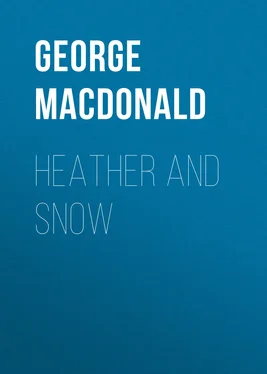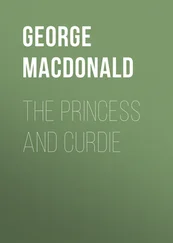George MacDonald - Heather and Snow
Здесь есть возможность читать онлайн «George MacDonald - Heather and Snow» — ознакомительный отрывок электронной книги совершенно бесплатно, а после прочтения отрывка купить полную версию. В некоторых случаях можно слушать аудио, скачать через торрент в формате fb2 и присутствует краткое содержание. Жанр: foreign_prose, foreign_religion, literature_19, foreign_antique, на английском языке. Описание произведения, (предисловие) а так же отзывы посетителей доступны на портале библиотеки ЛибКат.
- Название:Heather and Snow
- Автор:
- Жанр:
- Год:неизвестен
- ISBN:нет данных
- Рейтинг книги:3 / 5. Голосов: 1
-
Избранное:Добавить в избранное
- Отзывы:
-
Ваша оценка:
- 60
- 1
- 2
- 3
- 4
- 5
Heather and Snow: краткое содержание, описание и аннотация
Предлагаем к чтению аннотацию, описание, краткое содержание или предисловие (зависит от того, что написал сам автор книги «Heather and Snow»). Если вы не нашли необходимую информацию о книге — напишите в комментариях, мы постараемся отыскать её.
Heather and Snow — читать онлайн ознакомительный отрывок
Ниже представлен текст книги, разбитый по страницам. Система сохранения места последней прочитанной страницы, позволяет с удобством читать онлайн бесплатно книгу «Heather and Snow», без необходимости каждый раз заново искать на чём Вы остановились. Поставьте закладку, и сможете в любой момент перейти на страницу, на которой закончили чтение.
Интервал:
Закладка:
'The Lord preserve's!—Aff han'?'
'There's no tellin what micht hae been i' the heid o' 'im: he didna win sae far as to say that onygait!'
'God forbid!' exclaimed her father with solemnity, after a short pause.
'I'm thinkin God's forbidden langsyne!' rejoined Kirsty.
'What said ye til 'im, lassie?'
'First I leuch at him—as weel as I can min' tho nonsense o' 't—and ca'd him the gowk he was; and syne I sent him awa wi' a flee in 's lug: hadna he the impidence to fa' oot upo' me for carin mair aboot Steenie nor the likes o' him! As gien ever he cud come 'ithin sicht o' Steenie!'
Her father looked very grave.
'Are ye no pleased, father? I did what I thoucht richt.'
'Ye cudna hae dune better, Kirsty. But I'm sorry for the callan, for eh but I loed his father! Lassie, for his father's sake I cud tak Francie intil the hoose, and work for him as for you and Steenie—though it's little guid Steenie ever gets o' me, puir sowl!'
'Dinna say that, father. It wud be an ill thing for Steenie to hae onybody but yersel to the father o' 'im! A muckle pairt o' the nicht he wins ower in loein at you and his mother.'
'And yersel, Kirsty.'
'I'm thinkin I hae my share i' the daytime.'
'And hoo, think ye, gangs the lave o' the nicht wi' 'im?'
'The bonny man has the maist o' 't, I dinna doobt, and what better cud we desire for 'im!—But, father, gien Francie come back wi' the same tale—I dinna think he wull efter what I telled him, but he may—what wud ye hae me say til 'im?'
'Say what ye wull, lassie, sae lang as ye dinna lat him for a moment believe there's a grain o' possibility i' the thing. Ye see, Kirsty,—'
'Ye dinna imagine, father, I cud for ae minute think itherwise aboot it nor ye du yersel! Div I no ken 'at his father gied him in chairge to you? and haena I therefore to luik efter him? Didna ye tell me a' aboot yer gran' freen' and hoo, and hoo lang ye had loed him? and didna that mak Francie my business as weel's yer ain? I'm verra sure his father wud never appruv o' ony gaeins on atween him and a lassie sic like's mysel; and fearna ye, father, but I s' hand him weel ootby. No that it's ony tyauve ( struggle ) to me, though I aye likit Francie! Haena I my ain Steenie?'
'Glaidly wud I shaw Francie the ro'd to sic a wife as ye wud mak him, my bonny Kirsty! But ye see clearly the thing itsel's no to be thoucht upon.—Eh, Kirsty, but it's gran' to an auld father's hert to hear ye tak yer pairt in his devours efter sic a wumanly fashion!'
'Am I no yer ain lass-bairn, father? Whaur wud I be wi' a father 'at didna keep his word? and what less cud I du nor help ony man to keep his word? Gien breach o' the faimily-word cam throuw me, my life wud gang frae me.—Wad ye hae me tell the laddie's mither? I wudna like to expose the folly o' him, but gien ye think it necessar, I'll gang the morn's mornin.'
'I dinna think that wud be weel. It wad but raise a strife atween the twa, ohn dune an atom o' guid. She wud only rage at the laddie, and pit him in sic a reid heat as wad but wald thegither him and his wull sae 'at they wud maist never come in twa again. And though ye gaed and tauld her yer ain sel, my leddy wad lay a' the wyte upo' you nane the less. There's no rizzon, tap nor tae, i' the puir body, and ye're naewise b'und to her farther nor to du richt by her.'
'I'm glaid ye dinna want me to gang,' answered Kirsty. 'She carries hersel that gran' 'at ye're maist driven to the consideration hoo little she's worth; and that's no the richt speerit anent onybody or thing God thoucht worth makin.'
CHAPTER IX
AT CASTLE WEELSET
Francie's anger had died down a good deal by the time he reached home. He was, as his father's friend had just said, by no means a bad sort of fellow, only he was full of himself, and therefore of little use to anybody. His mother and he, when not actually at strife, were constantly on the edge of a quarrel. The two must have their own way, each of them. Francie's way was sometimes good, his mother's sometimes not bad, but both were usually selfish. The boy had fits of generosity, the woman never, except toward her son. If she thought of something to please him, good and well! if he wanted anything of her, it would never do! The idea must be her own, or meet with no favour. If she imagined her son desired a thing, she felt it one she never could grant, and told him so: thereafter Francis would not rest until he had compassed the thing. Sudden division and high words would follow, with speechlessness on the mother's part in the rear, which might last for days. Becoming all at once tired of it, she would in the morning appear at breakfast looking as if nothing had ever come between them, and they would be the best of friends for a few days, or perhaps a week, seldom longer. Some fresh discord, nowise different in character from the preceding, would arise between them, and the same weary round be tramped again, each always in the right, and the other in the wrong. Every time they made it up, their relation seemed unimpaired, but it was hardly possible things should go on thus and not at length quite estrange their hearts.
In matters of display, to which Francis had much tendency, his mother's own vanity led her to indulge and spoil him, for, being hers, she was always pleased he should look his best. On his real self she neither had nor sought any influence. Insubordination or arrogance in him, her dignity unslighted, actually pleased her: she liked him to show his spirit: was it not a mark of his breeding?
She was a tall and rather stout woman, with a pretty, small-featured, regular face, and a thin nose with the nostrils pinched.
Castle Weelset was not much of a castle: to an ancient round tower, discomfortably habitable, had been added in the last century a rather large, defensible house. It stood on the edge of a gorge, crowning one of its stony hills of no great height. With scarce a tree to shelter it, the situation was very cold in winter, and it required a hardy breeding to live there in comfort. There was little of a garden, and the stables were somewhat ruinous. For the former fact the climate almost sufficiently accounted, and for the latter, a long period of comparative poverty.
The young laird did not like farming, and had no love for books: in this interval between school and college, he found very little to occupy him, and not much to amuse him. Had Kirsty and her family proved as encouraging as he had expected, he would have made use of his new pony almost only to ride to Corbyknowe in the morning and back to the castle at night.
His mother knew old Barclay, as she called him, well enough—that is, not at all, and had never shown him any cordiality, anything, indeed, better than condescension. To treat him like a gentleman, even when he sat at her own table, she would have counted absurd. He had never been to the castle since the day after her husband's funeral, when she received him with such emphasized superiority that he felt he could not go again without running the risk either of having his influence with the boy ruined, or giving occasion to a nature not without generosity to take David's part against his mother. Thenceforward, therefore, he contented himself with giving Francis invariable welcome, and doing what he could to make his visits pleasant. Chiefly, on such not infrequent occasions, the boy delighted in drawing from his father's friend what tales about his father, and adventures of their campaigns together, he had to tell; and in this way David's wife and children heard many things about himself which would not otherwise have reached them. Naturally, Kirsty and Francie grew to be good friends; and after they went to the parish school, there were few days indeed on which they did not walk at least as far homeward together as the midway divergence of their roads permitted. It was not wonderful, therefore, that at length Francis should be, or should fancy himself in love with Kirsty. But I believe all the time he thought of marrying her as a heroic deed, in raising the girl his mother despised to share the lofty position he and that foolish mother imagined him to occupy. The anticipation of opposition from his mother naturally strengthened his determination; of opposition on the part of Kirsty, he had not dreamed. He took it as of course that, the moment he stated his intention, Kirsty would be charmed, her mother more than pleased, and the stern old soldier overwhelmed with the honour of alliance with the son of his colonel. I do not doubt, however, that he had an affection for Kirsty far deeper and better than his notion of their relations to each other would indicate. Although it was mainly his pride that suffered in his humiliating dismissal, he had, I am sure, a genuine heartache as he galloped home. When he reached the castle, he left his pony to go where he would, and rushed to his room. There, locking the door that his mother might not enter, he threw himself on his bed in the luxurious consciousness of a much-wronged lover. An uneducated country girl, for as such he regarded her, had cast from her, not without insult, his splendidly generous offer of himself!
Читать дальшеИнтервал:
Закладка:
Похожие книги на «Heather and Snow»
Представляем Вашему вниманию похожие книги на «Heather and Snow» списком для выбора. Мы отобрали схожую по названию и смыслу литературу в надежде предоставить читателям больше вариантов отыскать новые, интересные, ещё непрочитанные произведения.
Обсуждение, отзывы о книге «Heather and Snow» и просто собственные мнения читателей. Оставьте ваши комментарии, напишите, что Вы думаете о произведении, его смысле или главных героях. Укажите что конкретно понравилось, а что нет, и почему Вы так считаете.












